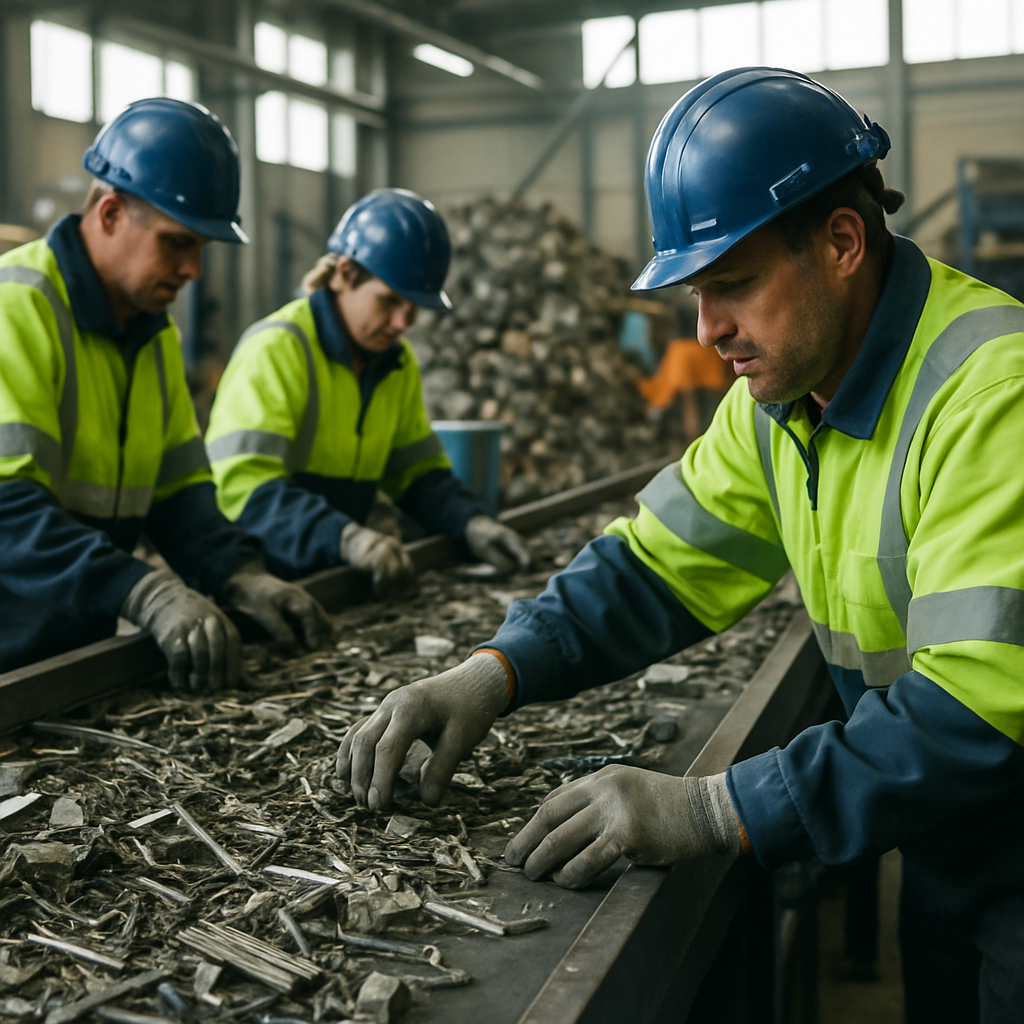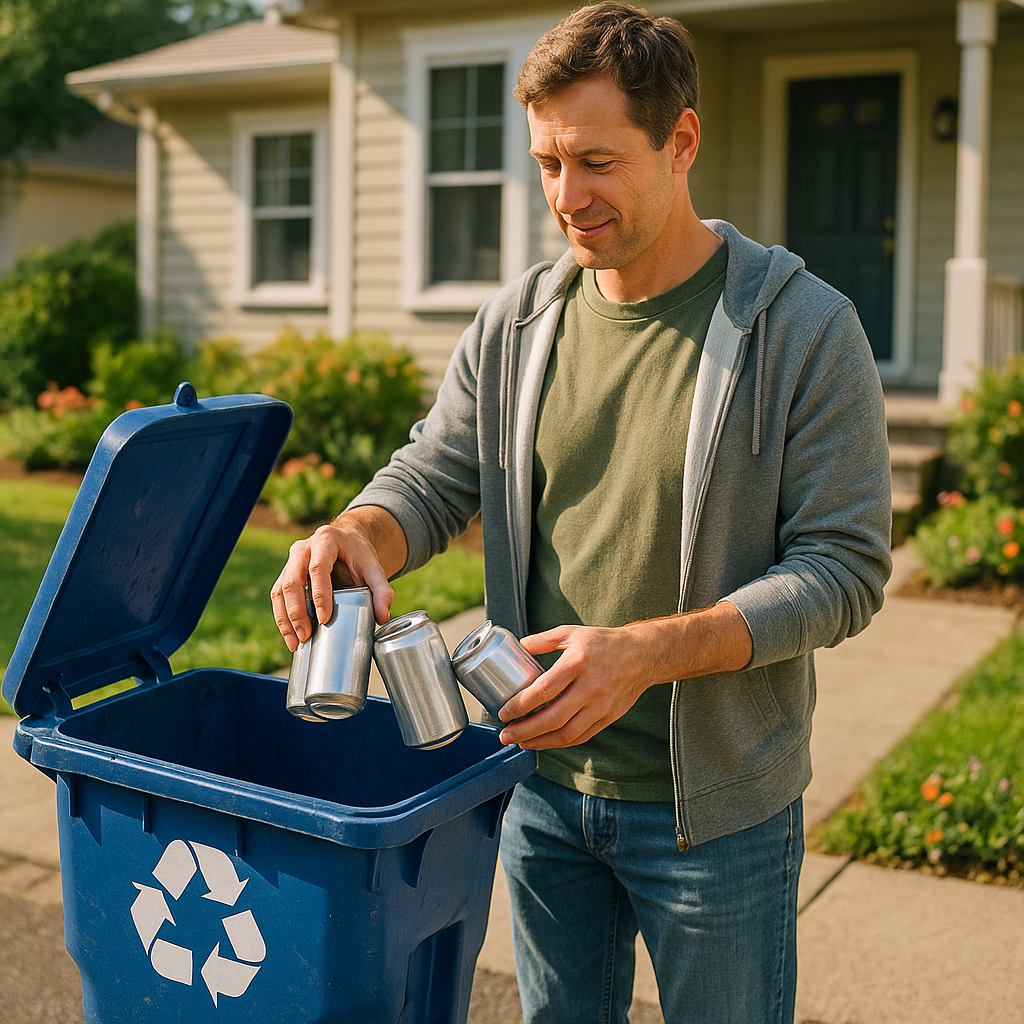5901 Botham Jean Blvd, Dallas, TX 75215
Local Aluminum Recycling in El Paso, TX: A Guide to What’s Accepted & How to Sell
November 11, 2025Every aluminum can recycled in El Paso saves enough energy to power a television for three hours. This single statistic highlights how local aluminum recycling embodies more than environmental stewardship; it showcases a significant economic opportunity that turns waste into valuable resources while preserving the natural landscape defining our border community.
Metal recycling in El Paso is a vital industry centered on environmentally responsible and economically sustainable practices, reclaiming and reprocessing materials like aluminum, steel, and copper. This process diverts scrap metal from landfills, conserves natural resources, and strengthens the local economy by generating jobs and fostering innovation in waste management practices. Advanced sorting techniques and modern equipment enable local facilities to efficiently process various metal alloys for use in manufacturing industries.
The impact goes beyond immediate environmental benefits. Local aluminum recycling requires only 5% of the energy needed for producing new aluminum from raw materials, significantly reducing greenhouse gas emissions and supporting a circular economy. For El Paso businesses and municipalities, engaging with established recycling providers fosters sustainable solutions, addressing both regulatory compliance and community environmental goals.
What Types of Aluminum and Other Metals are Accepted?
Recycling centers in El Paso accept a comprehensive range of both ferrous and non-ferrous metals. Understanding these categories helps municipalities and businesses identify which materials can be processed through local recycling facilities.
Non-Ferrous Metals
Non-ferrous metals contain no iron and resist rust and corrosion. These materials command higher market values due to their durability and reusability in manufacturing applications.
Aluminum is the most common non-ferrous metal in municipal waste streams. Aluminum cans from beverage containers process efficiently through sorting equipment. El Paso facilities accept all aluminum varieties, including siding and gutters from construction projects.
Copper materials generate significant revenue for recycling operations. Electrical wiring, plumbing pipes, and air conditioning components contain valuable copper that facilities readily process. Brass fixtures and fittings also fall into this category, along with lead materials from older construction applications.
Zinc components from galvanized materials and nickel alloys from industrial equipment round out the non-ferrous category. These metals maintain their properties through multiple recycling cycles, making them highly sought after by manufacturing industries.
Ferrous Metals
Ferrous metals contain iron and make up the largest volume of recyclable metals in most waste management systems. Steel and iron materials dominate this category across residential and commercial sources.
Old appliances represent a major source of ferrous metals. Refrigerators, washing machines, and water heaters contain substantial amounts of steel that processing facilities can efficiently recover. Air conditioners combine both ferrous and non-ferrous components, requiring separation during processing.
Construction materials provide another significant source. Metal fencing, structural steel, and shelving systems from commercial renovations contain high-grade steel suitable for remanufacturing. These materials often arrive in large quantities, making them economically attractive for recycling operations.
Common Accepted Items
Municipal recycling programs typically accept aluminum cans as the most recognizable metal recyclable. These lightweight containers sort easily and maintain high recycling rates across residential collection systems.
Commercial generators contribute larger items including HVAC systems, industrial equipment, and structural components. These materials require specialized handling but offer substantial recovery value due to their metal content and size.
Automotive components, while not mentioned in every program, often include radiators, engines, and body panels. These items combine multiple metal types and require careful processing to separate different alloys effectively.
What Does the Metal Recycling Process Involve?

Collection forms the foundation of effective scrap metal recycling. We gather materials from diverse sources, including construction sites, manufacturing facilities, demolition projects, and residential locations. This phase requires specialized containers designed for different metal types to prevent contamination and ensure safe transportation. Industrial clients often collaborate with us to establish scheduled pickup routes aligned with their production cycles.
Sorting is a critical phase in the recycling process. Once materials arrive at our facility, we separate metals from non-recyclable debris using both manual inspection and automated systems. Magnetic separators are essential for distinguishing ferrous metals like steel and iron from non-ferrous materials like aluminum, copper, and brass. We also use density-based separation techniques and color identification to further categorize materials by metal alloys and grade levels.
Quality control measures during sorting ensure maximum recovery rates. Our team removes plastic coatings from copper wire, strips non-metal components from mixed materials, and evaluates each load for purity standards. This meticulous sorting process directly impacts the value of recycled materials and the efficiency of subsequent processing steps.
Processing and preparation transform sorted materials into forms suitable for melting and refinement. State-of-the-art equipment compacts loose materials to optimize transportation and storage space. Hydraulic machinery cuts large metal pieces into manageable sizes, while specialized shears handle different material densities and compositions. This preparation phase reduces energy requirements for melting operations.
Shredding breaks materials into smaller, uniform pieces that facilitate efficient melting. The process uses hammer mills and other mechanical systems to achieve optimal surface-to-volume ratios. Smaller metal fragments melt faster and more evenly, reducing energy consumption and improving the quality of the final recycled product. According to Stanford University, recycling one ton of steel saves 642 kWh of energy compared to producing new steel from raw materials.
The coordinated sequence of collection, sorting, and processing creates an efficient pathway from scrap materials to manufacturing-ready feedstock. Each step builds on the previous phase to maximize material recovery while maintaining quality standards. This systematic approach enables us to transform diverse waste streams into valuable resources for steel mills, foundries, and other manufacturing operations.
What is Required to Sell Scrap Metal in El Paso?
All material suppliers must present a valid government-issued photo ID when selling scrap metal at recycling facilities. This requirement applies universally across El Paso and includes driver’s licenses, military IDs, or state identification cards. Recycling centers are required to photocopy and maintain these identification documents to comply with Texas scrap metal regulations.
In addition to identification, sellers must provide other documentation and information. Material suppliers need to sign statements indicating they own or are authorized to sell the metal. They must also provide a right thumbprint and sign a declaration that they have not been convicted of metal theft.
Recycling facilities prioritize safety through clean and well-organized yards. These safety protocols protect both employees and customers throughout the transaction process. Facilities maintain proper equipment handling procedures and follow established protocols for material processing and storage.
Customer service remains efficient at most scrap metal centers in El Paso. Customers can drop off scrap metal without scheduling appointments in advance. This allows for flexible timing and reduces barriers for individuals and businesses looking to recycle materials quickly.
Vehicle information must be recorded during transactions, including the make, model, and license plate number of the transport vehicle. Sellers must provide their name, address, and phone number for facility records. Photography requirements include images of both the seller’s face and the materials being sold, which facilities keep on file for specified retention periods.
Payment restrictions apply to certain regulated metals under Texas law. Cash payments for materials like copper or aluminum wire are limited to $25 per transaction. Amounts exceeding this limit require payment by check, money order, or electronic funds transfer. Some materials are subject to a 72-hour waiting period before payment processing.
Conclusion: How to Get Started with Aluminum Recycling

Aluminum recycling in El Paso offers both environmental and economic benefits for residents and businesses looking for sustainable waste management solutions. Local facilities such as SA Recycling and Lucero Scrap provide accessible opportunities to turn scrap metal into cash, thereby supporting the local economy. The process is simple: collect aluminum cans, appliances, and other aluminum materials, then visit these certified facilities during business hours with proper identification.
Starting with aluminum recycling presents a profitable solution that conserves natural resources and reduces landfill waste. The financial returns from recycling aluminum, along with its positive environmental impact, make it an excellent choice for sustainable waste management in the El Paso community.
For comprehensive recycling services and expert guidance on maximizing your aluminum recycling efforts, contact Okon Recycling at 214-717-4083.
